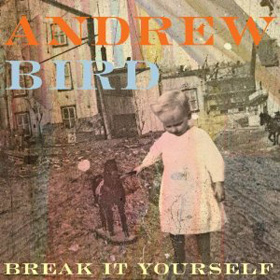Break It Yourself by Andrew Bird

5/5
Chicago native Andrew Bird began his career as a prolific multi-instrumentalist when he first began taking violin lessons at the age of four. He later studied blues, gypsy jazz and American and European folk. His first collaboration was with a band called Squirrel Nut Zippers, and Bird later formed his own band, Andrew Bird's Bowl of Fire. Three interesting albums later, he discovered his potential as a solo musician and began to drastically remake himself as an artist. Bird’s collaborative past helps to paint a picture of his still very experimental solo career. He’s not afraid to change his sound with each new album, and he has developed a knack for strangely mysterious content, witty lyrics and studio whistling.
Break it Yourself is Bird’s sixth solo full-length album following 2009’s Noble Beast. It was produced and recorded by Bird in his barn in Western Illinois, which might explain the album’s open sky sound that makes listeners feel like they might be alone. Break it Yourself overflows with obscure lyrics, lilting hums, whistles and other unknown noises, giving the album a most sunny disposition soaked in melancholy and humor.
Bird is more than comfortable with adding short instrumentals to his albums. In fact, several tracks on Break It Yourself exist as little breaths of fresh air, interludes that give listeners a break from context and words. One of these tracks, “Polynation,” is barely over a minute long and filled with ambient sounds that fade into sounds of a baby breathing. From just these few noises, it seems as if you’ve heard and felt an entire story, an example of the musicality Andrew Bird is extremely good at accomplishing as a solo artist.
The upbeat track “Eyeoneye” is another example of this musicality. The track, from which Bird gets the title of the album, has an ever-catchy chorus—soon enough you hardly realize that you’re singing along to a song about breaking your own heart. “Lusitania” and “Fatal Shore” both reference the historical sinking of naval ships (the latter a reference to the U.S.S. Maine) but by the end of both tracks the audience can tell that both are essentially about failing relationships. In any case, Bird offers some essential advice for survival on a deserted island that could easily apply to relationships: “Breath in and out.”
The album shifts with the Americana track “Danse Carribe.” The steel drums and tropical feel is not something to expect from Bird, but the song does make you wonder why you’re not at the beach. Bird has said this track is about autonomy and that the album as a whole has an evolving theme of the “lonely island.” After becoming intertwined in the album’s concept, listeners realize that Bird has a subtle way of combining historical and scientific knowledge with emotional struggle, all while carefully constructing joyful songs.
For example, “Hole in the Ocean Floor” is an eight-minute track that sounds like a dozen long meditative breaths. However, listeners should note Bird’s references to a recent massive disaster in America's environmental history: “There's a hole in the ocean floor / Who's gonna stop it bleeding?” The album slowly nods off with the sound of wind chimes and crickets on the final instrumental track “Belles.” By the end of Break It Yourself, it feels as if listeners could have been lulled to sleep, resting soundly for a decade (on a beach, of course!). Bird seems to have found that rare ability to address weighty issues on a very human level without sounding pained or losing listeners’ attention. In fact, he sounds completely at ease, as if he wants his audience to feel comforted too—in a word, Break It Yourself is a lullaby.
Release Date: March 6, 2012
Label: Mom and Pop Records
5 of 5 Stars
RELATED ARTICLES
Get the most-revealing celebrity conversations with the uInterview podcast!







Leave a comment